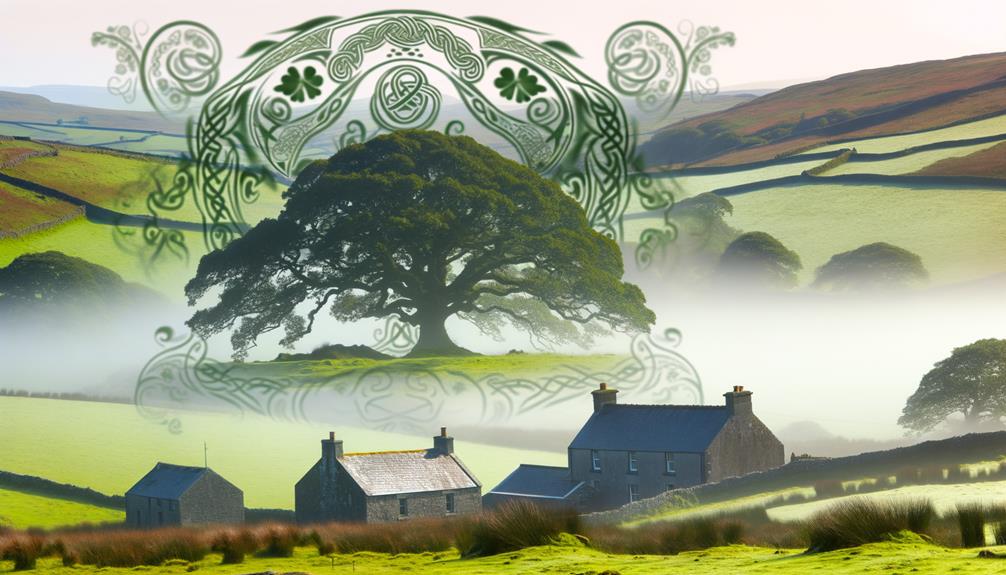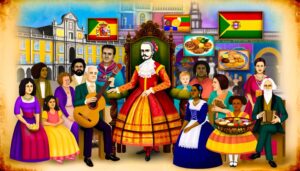Moore Name Meaning and Origin
The surname Moore has multifaceted origins. In England, it derives from the Old English word 'mor,' meaning 'marsh' or 'moorland.' This topographical surname can be traced back to early records like the Domesday Book of 1086.
In Ireland, Moore comes from the Gaelic 'Ó Morda,' meaning 'descendant of Morda,' which signifies 'stately' or 'noble.' Geographic distribution shows significant Moore populations in the United States, Canada, and Australia, showcasing its global reach. Historically, Moores have been influential landowners, political reformers, and pioneers in various fields.
The nuances of the Moore surname's origin reveal a rich tapestry of cultural history.

Key Takeaways
- The surname Moore originates from the Old English word 'mor,' meaning 'marsh' or 'moorland.'
- In Ireland, Moore derives from the Gaelic 'Ó Morda,' meaning 'descendant of Morda,' signifying nobility.
- Moore is a topographical surname, initially used for identification in medieval England.
- The Moore surname is widespread globally, particularly in the U.S., Canada, and Australia due to immigration.
- Historical Moores were influential in landownership, politics, and social reforms across various periods.
English Origins of Moore
The surname Moore, one of the most common names in the English-speaking world, can trace its origins back to the Anglo-Saxon period in England. Deriving from the Old English word 'mor,' meaning 'marsh' or 'moorland,' the name likely described individuals who resided near or worked in such landscapes.
Early records, such as the Domesday Book of 1086, document the use of 'Mor' as a topographical surname. This geographical linkage was a practical method of identification in a time when populations were growing and mobility was limited.
The name's prevalence in historical documents indicates its widespread adoption and the importance of moorlands in shaping local communities and their identities during the early medieval period.
Irish Roots of Moore
Although the surname Moore is widely recognized for its English origins, it also holds significant historical and cultural roots in Ireland, where it is often derived from the Gaelic name 'Ó Morda,' meaning 'descendant of Morda.' The name 'Morda' itself signifies 'stately' or 'noble,' hinting at a lineage of prominence.
Historically, the Ó Morda clan was influential in the Leinster region, notably in counties Laois and Offaly. The Irish Moores were known for their leadership and resilience, particularly during the medieval period.
This dual origin of the Moore surname illustrates the intricate tapestry of cultural and historical influences that shape family names, reflecting both geographical and societal dynamics over centuries.
Geographic Distribution
Beyond its rich historical roots in both England and Ireland, the Moore surname has seen widespread geographic distribution across the globe, particularly flourishing in regions influenced by British and Irish diaspora.
In the United States, Moore ranks among the most common surnames, a reflection of extensive immigration during the 19th and early 20th centuries. Similarly, Canada and Australia, both former British colonies, exhibit significant populations bearing the Moore surname. In these countries, the name often retains its original cultural ties while also integrating into the broader national identity.
Additionally, the surname has permeated various European nations, showcasing both historical migrations and contemporary mobility. This widespread presence underscores Moore's adaptability and enduring appeal in diverse sociocultural contexts.
Historical Significance
In tracing the historical significance of the Moore surname, one uncovers a tapestry interwoven with social, political, and cultural threads that illuminate its prominent role through various epochs. The name Moore has been linked to numerous historical periods, reflecting its bearers' involvement in pivotal events and societal developments. From medieval feudal systems to colonial expansions, individuals bearing the Moore name have left indelible marks on history. The table below encapsulates key historical contexts where the Moore surname has appeared:
| Period | Context | Significance |
|---|---|---|
| Medieval Era | Feudal Lords | Influential landowners and protectors within feudal hierarchies. |
| Renaissance | Political Figures | Active participants in the socio-political reformation. |
| Colonial Era | Settlers and Explorers | Pioneers in the colonization and exploration of new territories. |
| Industrial | Innovators and Industrialists | Key players in industrial advancements and economic transformations. |
| Modern Era | Cultural Icons | Contributors to cultural, academic, and social progress in contemporary society. |
Famous Moores
Among the illustrious individuals bearing the Moore surname, numerous figures have achieved prominence across diverse fields such as politics, science, arts, and sports.
In politics, Sir Thomas More, known for his 1516 work 'Utopia,' stands out as a key historical figure.
In science, Gordon Moore, co-founder of Intel, is celebrated for pioneering advancements in semiconductor technology and for Moore's Law, which predicts the exponential growth of computing power.
The arts are enriched by Michael Moore, a provocative filmmaker known for his documentaries on social issues.
In sports, Dudley Moore's legacy continues in the world of soccer.
These distinguished Moores, spanning various domains, exemplify the remarkable contributions this surname has made to global culture and progress.
Conclusion
The surname Moore, with its rich tapestry of English and Irish origins, showcases a diverse geographic distribution and historical significance.
Rooted in both occupational and descriptive etymologies, Moore's legacy spans centuries, influencing cultural and social landscapes.
The name's enduring presence is further highlighted by notable individuals bearing the surname, contributing to various fields across history.
In examining Moore, one unearths not just a name, but a narrative steeped in the annals of time, akin to a medieval tapestry woven with threads of heritage and identity.






